LEONARD PEIKOFF is the preeminent Rand scholar writing today. He worked closely with Ayn Rand in New York City for thirty years and was designated by her as heir to her estate. He has taught philosophy at several places, including Hunter College and New York University. Dr. Peikoff is the author of The DIM Hypothesis and Objectivism: The Philosophy of Ayn Rand. He grew up in western Canada and now lives in Southern California.
Copyright 1982 by Peikoff Lectures, Inc.
Penguin supports copyright. Copyright fuels creativity, encourages diverse voices, promotes free speech, and creates a vibrant culture. Thank you for buying an authorized edition of this book and for complying with copyright laws by not reproducing, scanning, or distributing any part of it in any form without permission. You are supporting writers and allowing Penguin to continue to publish books for every reader.
Peikoff, Leonard.
[Ominous parallels. Selections]
The cause of Hitler's Germany / Leonard Peikoff.
Includes bibliographical references and index.
1. Philosophy, GermanHistory. 2. Philosophy, AmericanHistory. 3. National socialism. 4. GermanyCivilization. 5. United StatesCivilization. I. Title.
PREFACE
As Ayn Rand indicates in her introduction, this book demonstrates how German philosophy led to Hitler and the Holocaust.
TheCause of Hitlers Germany is about two-thirds of The Ominous Parallels, a book of mine first published in 1982. In the book, I intended a warning: If Americans continue to accept and act on the same philosophic ideas that led to the Third Reich, then America will have to follow a parallel course and suffer the same result.
The book, accordingly, studied American culture and history in as much detail as that given to Germany. Given our cultural state, however, I did not expect any such warning to be heeded or even heard, and it wasnt. There is no improvement in the thirty years since, no change in the basic ideas ruling the United States (and the West as a whole). The Soviet Empire has collapsed, but the ideas of irrationalism, self-sacrifice, and collectivism still dominate and fuel murderous tyrannies, primarily now in the upsurging Middle East, but elsewhere, too.
Unlike The Ominous Parallels, this substantial portion of it is offered not primarily as a warning but rather as an explanation. To this day, Nazism remains vivid in the public mind as the greatest evil in human history, and continues to be the subject or background of countless novels, films, and nonfiction analyses. But the artists and scholars still have no real explanation; they are no closer than they were in 1982 to identifying the fundamental roots of Nazism.
For this reason, I agreed with the suggestion of Dr. Michael Berliner that I bring out this reduced version of my book. It was Dr. Berliner who first thought of such a possibility, who initiated the project, and who oversaw the development of its various stages. He wanted a book that would focus only on the Nazi aspects: on their intellectual origins in German philosophy, and then on their manifestations in Weimar culture and, as a result, in the world of Hitler. My approach to discovering the cause of Nazism is, I believe, unique and worthy of special attention; I am hopeful that this time it may reach its audience. If we are to survive todays world, someand ever morepeople must come to understand that abstract theory is what produces existential consequences, both personal and social.
Eleven of the sixteen chapters of The Ominous Parallels are included in this book. In omitting the other five chapters, I have eliminated a great deal: the material, analyzing our countrys decline into an intellectually Germanized culture, thereby showing how and why the mind of the Enlightenment gave way to religion, pragmatism, and nihilism, all of it expressed by the shrinking of Americanism in our publics attitude, and by the ever-growing scale and power of our government. The solution, I argued, is to replace the philosophy of Kant and Hegel with the pro-reason, pro-individualism viewpoint of Ayn Rand.
I have made some minuscule changes to the original wording, cutting out a few lines here and there that refer to the omitted chapters.
Leonard Peikoff
Aliso Viejo, California
February 2013
P.S. If, after reading this book, you are interested in a broader and deeper discussion of the relationship between philosophy and culture/politics, I refer you to my latest book: The DIM Hypothesis: Why the Lights of the West Are Going Out (2012). But this book is technical and requires some background, so read the one in your hands first.
From Ayn Rands 1980 Introduction to
THE OMINOUS PARALLELS
I t gives me great pleasure to introduce the first book by an Objectivist philosopher other than myself.
Perhaps the best recommendation I can give this bookand its author, Dr. Leonard Peikoffis to say that it and he are not of todays cultural mainstream. They will be part of tomorrows.
It is not necessary for me to prove that something is wrong with todays world. Everybodyof any creed, color, or intellectual persuasion, old and young, rich and poor, conservative and liberal, foreign and domesticsenses that something monstrous is destroying the world. But no one knows what it is, and people keep blaming one anotherwith some justice.
As a symptom of todays cultural anxiety, observe the unusual interest in and the deluge of books dealing with Nazi Germany. Every sort of semi-plausible and wholly impossible theory has been offered in futile attempts to find the cause and explain the rise of Nazism. The failure of those explanations intensifies the quest: men seem to sense that the collapse of what had been a civilized country into such monstrous evil must be understood if we are to make certain that it will not be repeated. We dare not brush aside unexplained a horror such as Nazism, states Dr. Peikoff. If we do not know its causes, how can we be sure that our own country is not traveling the same road?
Dr. Peikoff answers these questions. He identifies the cause of Nazism.... He demonstrates that there is a science which has been all but obliterated in the modern world. Yet this science determines the destiny of nations and the course of history... , he writes. It is the science which had to be destroyed, if the catastrophes of our time were to become possible. The science is philosophy.
The non-modern (and non-old-fashioned) aspect of Leonard Peikoffs book is the breadth of his vision and the stunning scale of his philosophic integration. He does not share the concrete-bound, college-induced myopia of those alleged philosophers who study the various meanings of the word but (the contemporary empiricists)nor does he share the foggy stumbling and the floating abstractions of their predecessors (the rationalists). He presents the history of Germanys philosophy, in telling essentials.... Then he presents the practical resultsthe way in which philosophic ideas direct the course and shape the particular events of the history of [the Weimar Republic], as reflected in politics, economics, art, literature, education, etc.

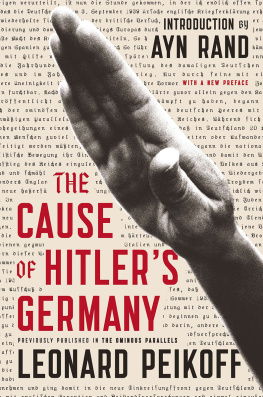
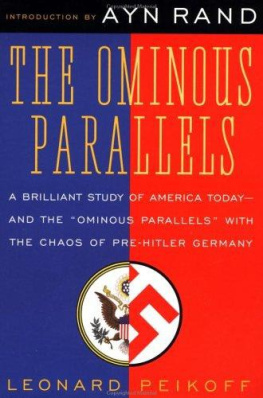



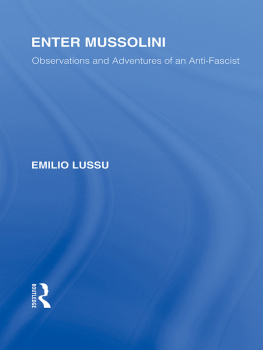



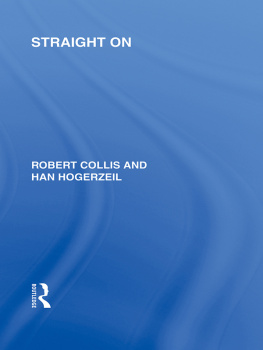
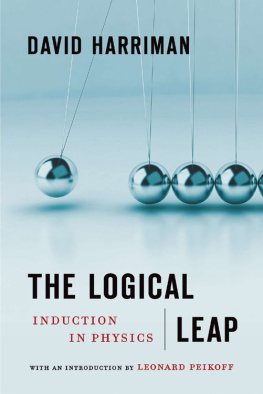




 REGISTERED TRADEMARKMARCA REGISTRADA
REGISTERED TRADEMARKMARCA REGISTRADA